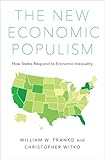The new economic populism: how states respond to economic inequality
Material type: TextPublication details: New York Oxford University Press 2018Description: xvi, 230 pISBN:
TextPublication details: New York Oxford University Press 2018Description: xvi, 230 pISBN: - 9780190671013
- 339.220973 F7N3
| Item type | Current library | Collection | Call number | Status | Date due | Barcode | Item holds | |
|---|---|---|---|---|---|---|---|---|
 Book
Book
|
Ahmedabad General Stacks | Non-fiction | 339.220973 F7N3 (Browse shelf(Opens below)) | Available | 198210 |
Donald Trump's 2016 victory shocked the world, but his appeals to the economic discontent of the white working class should not be so surprising, as stagnant wages for the many have been matched with skyrocketing incomes for the few. Though Trump received high levels of support from the white working class, once in office, the newly elected billionaire president appointed a cabinet with a net worth greater than one-third of American households combined. Furthermore, he pursued traditionally conservative tax, welfare state and regulatory policies, which are likely to make economic disparities worse. Nevertheless, income inequality has grown over the last few decades almost regardless of who is elected to the presidency and congress.
There is a growing consensus among scholars that one of the biggest drivers of income inequality in the United States is government activity (or inactivity). Just as the New Deal and Great Society programs played a key role in leveling income distribution from the 1930s through the 1970s, federal policy since then has contributed to expanding inequality. Growing inequality bolsters the resources of the wealthy leading to greater influence over policy, and it contributes to partisan polarization. Both prevent the passage of policy to address inequality, creating a continuous feedback loop of growing inequality.
https://global.oup.com/academic/product/the-new-economic-populism-9780190671013?q=The%20new%20economic%20populism:%20how%20states%20respond%20to%20economic%20inequality&lang=en&cc=us#
There are no comments on this title.

